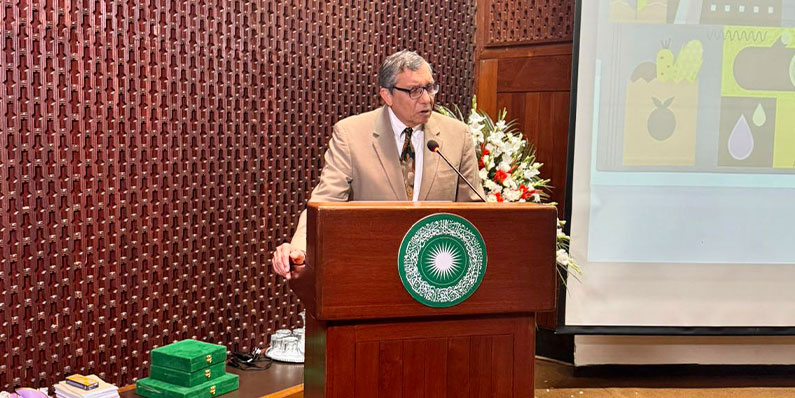Experts Discuss Climate Change, Agriculture, and Nutrition at Karachi Conference 2025
Experts gather in Karachi to discuss climate change, agriculture, and nutrition at AKU's annual conference, offering solutions for Pakistan's climate resilience.
Experts Discuss Climate Change, Agriculture and Nutrition at a two-day high-profile conference hosted by the Aga Khan University’s (AKU) Institute for Global Health & Development (IGHD) in Karachi. Organized in collaboration with the Sustainable Development Solutions Network (SDSN) Pakistan, the event convened researchers, policymakers, and development practitioners to confront the intertwined challenges of climate change, food insecurity, and malnutrition in Pakistan.
In his opening address, Dr. Zulfiqar A. Bhutta, Founding Director of IGHD, emphasized:
“Climate change is not just an environmental crisis—it is a threat multiplier affecting health, nutrition, and livelihoods. Pakistan stands at a critical juncture.”
Global Experts Share Key Insights
International Collaboration and Scientific Data
Keynote speakers at the conference included:
-
Prof Sir Andrew Haines – London School of Hygiene & Tropical Medicine
-
Dr Lynette Neufeld – Director of Food & Nutrition, FAO
-
Dr Haris Gazdar – Collective for Social Science Research, Pakistan
They highlighted that while wealthy nations contribute the most greenhouse gas emissions, the most vulnerable countries bear the brunt, as underscored by findings published in the New England Journal of Medicine. A related Nature Climate Change study showed over 35% of heat-related deaths (1990-2018) stemmed from human-induced climate change.
“Climate impacts are grossly unequal and demand global accountability,” noted Prof Haines.
Pakistan’s Climate Crisis: A Call for Inclusive Action
Pakistan is already experiencing the realities of climate change:
-
Rising temperatures
-
Unpredictable monsoon patterns
-
Agricultural disruptions
-
Worsening food insecurity
These factors disproportionately affect rural women and marginalized communities, increasing workload and reducing access to nutrition and healthcare.
Speakers advocated for:
-
Equity-focused adaptation strategies
-
Gender-sensitive policy frameworks
-
Nature-based climate solutions
-
Cross-sector collaboration
“Without inclusive approaches, we risk deepening existing inequalities,” said Dr. Neufeld of the FAO.
AKU’s Vision for a Sustainable Future
The conference also showcased AKU’s commitment to evidence-based solutions through education, research, and policy advocacy.
Dr. Mukhtar Ahmed, Chairman, Higher Education Commission of Pakistan, stressed:
“The challenges posed by climate change are monumental, but so are the opportunities to innovate and transform.”
Dr. Sulaiman Shahabuddin, President of AKU, added:
“We aim to inspire solutions that strengthen resilience and ensure a sustainable future for Pakistan and beyond.”
Key Takeaways from the Conference
Strategic Recommendations:
-
Invest in climate-smart agriculture
-
Strengthen food systems for nutritional security
-
Promote renewable energy use in farming communities
-
Encourage inter-sectoral partnerships among health, agriculture, and education
LSI Keywords to Remember:
-
Climate resilience in Pakistan
-
Climate-smart agriculture
-
Nutrition and food security
-
Sustainable development goals
-
Gender and climate justice
-
Climate adaptation strategies
Conclusion: Building Climate-Resilient Communities
The Annual Conference on Climate Change, Agriculture, Human Nutrition & Development in Pakistan marked a significant step in driving national and global conversations. As Pakistan faces some of the harshest climate vulnerabilities in the region, multi-stakeholder engagement—like that facilitated by AKU and SDSN Pakistan—is key to mitigating disaster and fostering sustainable development.
By integrating research, policy, and community-based interventions, Pakistan can pave a path toward resilience, equity, and long-term prosperity.







